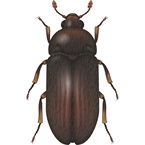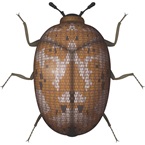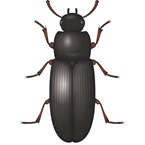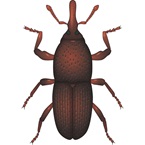Classification
Species category: Beetles & Weevils
Scientific name: Alphitobius diaperinus
Family:Tenebrionidae
Description:
Typically, an adult will reach 5.5-6.7mm in length and is shiny dark-brown or black. The long oval body has longitudinal strips of perforation-like indentations on the wing cover. They also have multi-segmented antennae which are paler at the tips.
Region:
A cosmopolitan species, it is believed to be a native of sub-Saharan Africa but is now readily found across the world.
Habitat:
In temperate climates, they are typically found indoors although, being reasonably cold tolerant, they will survive in unheated buildings.
The Lesser Mealworm beetle is widely distributed in animal houses and especially poultry houses where the conditions reflect those of its tropical origin.
Behaviour:
Lesser Mealworm Beetles are associated with a variety of stored products. This pest favours humidity and warmth and is most prevalent in environments that offer a combination of both.
They eat an extensive variety of foods from carrion to insects and fungus to grain. These nocturnal creatures can lay 100s of eggs in a lifetime, which it lays on a food source for the larvae to thrive.
Risks:
Known vectors of diseases, particularly poultry diseases, they present a significant threat to poultry houses where they transmit Marek’s disease, and Newcastle disease, amongst others.Lesser Mealworm beetles infest a range of stored products including cereals, farinaceous products, oilseeds, groundnuts and bones but are not regarded as major pests in this area as they select grains that have been previously damaged by for e.g., moulds.
Their presence is an indication of poor hygiene. Infestations in animal houses are often introduced by way of contaminated feed.
When looking for a suitable pupation site, the larvae chew holes in a wide variety of materials from building insulations through to timbers, causing destruction.




